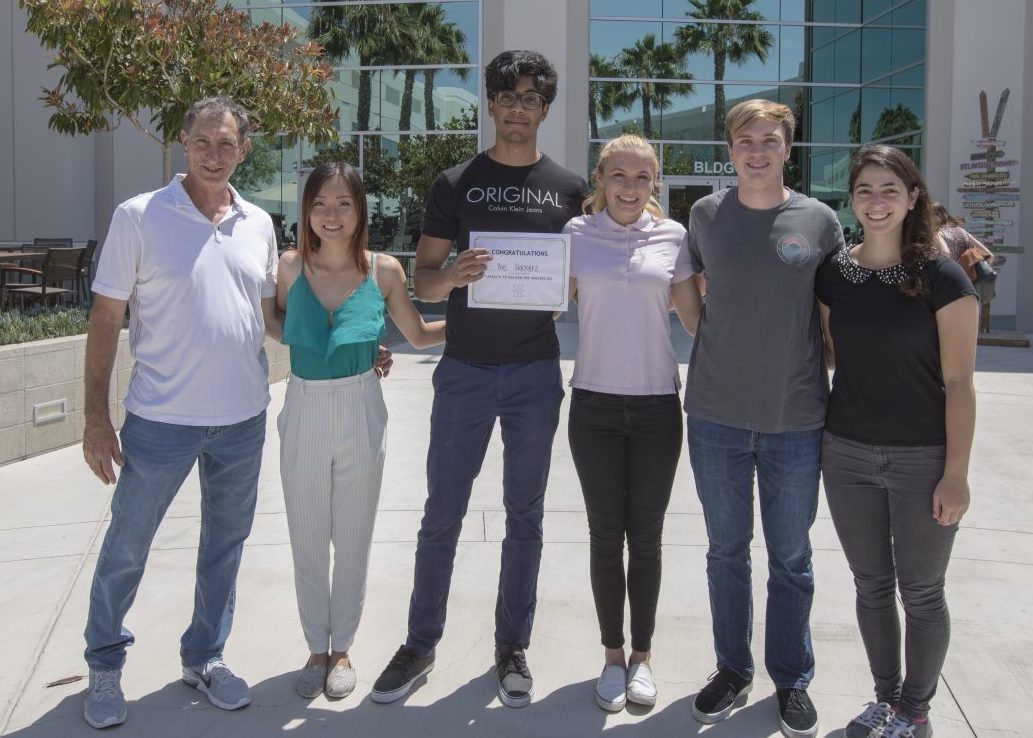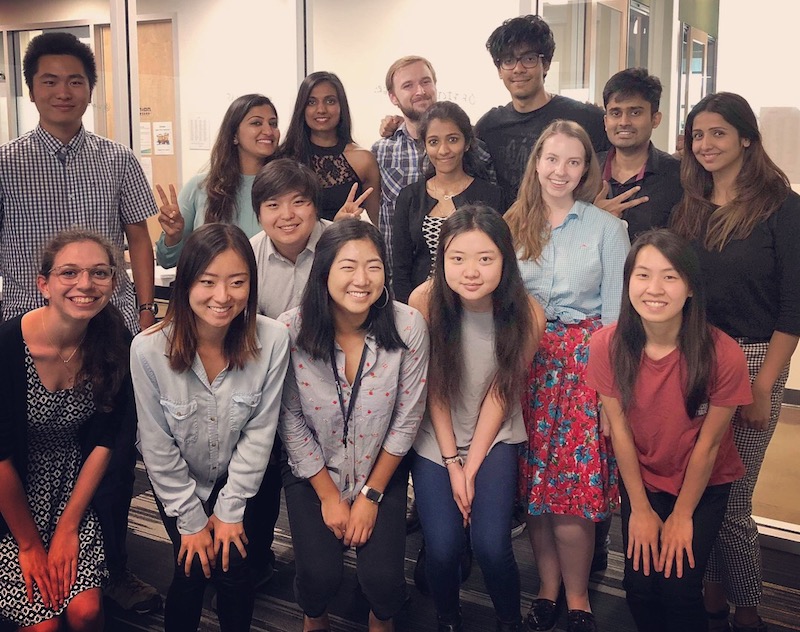Internship
22 Aug 2018
Introduction
I had the wonderful oppurtunity to work as a Software Engineering Intern for Viasat at Carlsbad in California this summer. This is the first time I’ve interned for a large multi-national company and it’s been a great experience. This blog post will be about my goals and expectations going into the internship and the invaluable experiences and lessons I gained this summer.
Working Culture
I was really suprised to find that the working environment at a big company like Viasat was fairly relaxed and casual. There was definitely an emphasis on getting the assigned work done in the allotted time; however, there was no restriction on how one achieved that. It was also pleasant to discover that the company had a fairly horizontal heriarchy where even the ideas and opinions of interns were well recieved and given importance.
I was assigned a workspace in a fishbowl, a lab with workstations and two glass walls, alongside about a dozen other interns. All of us were working on somewhat similar projects associated with Broadband Communications (BBC) . The supervisor for my project worked nearby and was very available and easy to reach out to through messenger. It was re-assuring to be able to sync up with him and remove blockers with his help at least once everyday.
It was also a very different coping with working a full time job, 40-hours per week, and living on a 8 am - 5 pm schedule. I really enjoyed the fact that after you left work and got home you were finished for the day and you could completely relax. This was verymuch unlike going to university where the lines between studying and relaxing were often blurred. It was easy to see why people found it comfortable to get adjusted to this kind of living.
Technical Learnings
The project I was assigned to involved creating a Zero Touch Provisioning (ZTP) system to automate the deployment and provisioning for the optical fiber network for the newest Viasat satellite Viasat-3 (also known as the Mythical Beast). Most of my work involved networking and software development in python.
One of the most significant technical learnings arose from the orchestration server that I was responsible for developing. The orchestration server was required to execute a long multistep workflow. I was recommended to use a flask server since we would not need to scale by very much and we just needed some simple endpoint functionality.
# Create an endpoint that executes the workflow
@app.route('/endpoint', methods=['GET'])
def func():
# step 1
stepOne()
# step 2
stepTwo()
# return from endpoint
return {'message': 'Success'}The problem with this design was that each step took a large amount of time to execute. Therefore, the total workflow approximated to about ~ 10 mins. That kind of time to complete a request would be considered bad design and would leave the caller hanging.
To solve this problem I needed to make the actual workflow asynchronous so that the endpoint could return immediately. However, this wasn’t easy because according to the official documentation “Flask is just not designed for large applications or asynchronous servers.”
After doing some research I found a really useful python library called Celery.
# Define a Celery task
@app.task(name="tasks.workflow")
def workflow(x, y):
z = x + y
# step 1
stepOne()
return z
# Create an endpoint that executes the workflow
@app.route('/endpoint', methods=['GET'])
def func():
# execute workflow asynchronously
workflow.apply_async(args=[arg1, arg2])
# return from endpoint
return {'message': 'Success'}As we can see now with the help of Celery our endpoint can finish execution almost immedaitely and our workflow can be executed by another thread in the background. Now you might be wondering how one would obtain the result or status of the workflow that has finished execution.
# Create an endpoint that checks workflow status
@app.route('/status/<taskId>', methods=['GET'])
def func(taskId):
# Get task object from id
task = workflow.AsyncResult(taskId)
# Check status
if task.state == 'PENDING':
# Workflow has not yet started
elif task.state != 'FAILURE':
# Workflow succesfully completed or is in progress
# Do something with state and result
else:
# Something went wrong in the background job
response = {
'state': task.state,
...
}
return jsonify(response)If you are interested in more details this is the (slightly outdated) blog post that I used as reference while developing the flask-celery orchestrator server for the required workflow: Using Celery With Flask.
Another interesting learning experience was setting up a PostgreSQL database from scratch on a remote CentOS server. This article came in very handy as I configured the server and database priviledges and settings for production: Configure and Install PostgreSQL for CentOS.
Lastly, bash scripting very much handy for automation various parts of the process especially workflow testing. I was able to learn more about and use the very useful terminal tool: tmux.
Soft Skills
It was a wonderful learning experience working with a team of complete strangers. Learning how to communicate most effectively with your team and being a valuable team player was more challenging than I expected. I noted that the team dynamic was certainly variable and was largely dependent on the supervisor that you were assigned to.
I was lucky enough to have a very friendly and personable supervisor. He did a great job introducing the project and he setup “tech-talks” with other members on our team so that we could learn about various technical concepts required for the project.
Another great skill I learned was how to connect with other interns and full time employees at the company. Meeting and conversing with them outside of work was a great way of getting to know people better. It was very useful asking them about their experience at Viasat and about working in the software engineering industry.
Another crucial part was learning how to talk about the project that you’ve worked on. It was pretty incredible being able to pitch our hackathon idea to the CEO of Viasat, Mark Dankburg at the intern hackathon. Similarly, it was nerve-racking but valuable experience demoing and presenting out project to our entire development team. I am sure these skills will prove to be very useful regardless of whether I pursue a more research-oriented or a more implementation-skewed career.
Social Experiences
Since I was going to be spending the majority of my summer interning for Viasat I was hoping for a good social atmosphere even outside of work. However, Viasat and my fellow interns blew whatever expectations I had out of the water.
Viasat did an excellent job keeping its interns busy with interesting events almost every weekend. There were many intern events, many organized and paid for by the company and some put together by the social chair among the interns (shoutout to my friends Riya and Pat).
My favorite events were definitely the day at the lagoon when the interns got the opputunity to use several boats, jet-skis and platoons. Not to mention the free Board & Brew food and refreshments that were also provided. I also really enjoyed participating in the Vollyball Tournament where we were assigned to a team of interns, new grads and full-times based off of self-scored skill-level. It gave us a great oopurtunity to network as well as learn/practice volleyball even for people (like me) who had never played before. Perhaps I enjoyed volleyball more than my fellow interns because I had a big advantage because of my abnormally large height.
The other event I really liked was the Viasat intern Hackathon for which they flew in 250+ interns from all over the country to participate. I really enjoy going to hackathons and innovating so, naturally, I could not miss this event. My team “The Slackers” was fortunate enough to win the prize for the category “Capacity to Deliver the Unexpected”. We built the Device Optimization Tool (DOT) that was essentially a more powerful version of Task Manager that tracked your CPU and bandwidth usage and allowed you to set thresholds and notifications for both. We even made an alexa skill as a means to notify you if you were away from your device or were not as tech-savy.

I was also fortunate enough to have some great people working alongside me at the fishbowl. It was suprising how we all got so close over a short-period of time. It was never a dull moment while working in the fishbowl. We would always be playing videos on Netflix on our three screen display in the front of the room and we would also make Costco runs to get snacks for our internal snack table. This ended up being great way to keep our rival fishbowl interns jealous of our setup.

All in all, it was definitely a blast meeting a lot of new people and making some meaningful friendships with many of them. I am certainly going to miss seeing them around. Hopefully I will get a chance to see some of them again.
Conclusion
I think this internship was most benificial to me because it gave me a great insight into what a software engineering job felt like and whether it was something I want to be doing for a living. It also gave me a lot to think about in terms of what kind of work culture I enjoy and see myself perservering in. I have a lot to thank Viasat for in addition to my supervisor and fellow interns.
I was fortunate enough to make it to the Viasat Corporate Blog so hopefully I made my mark at Viasat. I can’t wait till next summer for my next internship!
